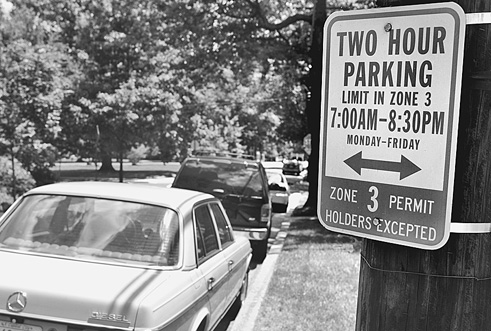Glover Park ANC tackles parking issues

By Deirdre Bannon...Current Correspondent...
If you ask advisory neighborhood commissioner Brian Cohen which issue he hears about most from Glover Park residents, his answer is simple: parking.
“I don’t think there’s any more universal concern in Glover Park than, ‘I can’t find a parking space,’” he said. “We hear about it at every ANC meeting; when I’m walking down the street, I hear it from people; I get emails from people. Nobody is happy with the parking situation, and everybody thinks we can do better.”
Residents say they face the toughest competition for parking spaces between 5 and 10 p.m., when many are coming home from work. It’s also a time when non-residents park in the neighborhood to visit friends or to go to dinner at one of the many restaurants along Wisconsin Avenue.
Cohen and his fellow Glover Park commissioners have spent the better part of the past year working with constituents, Ward 3 D.C. Council member Mary Cheh’s office and the D.C. Department of Transportation to find ways to open up more parking spaces in the neighborhood. This fall they plan to recommend that the city increase restrictions on non-resident parkers to do just that.
Specifically, the commission is suggesting that restricted hours for non-residents be increased for the entire commission area. The group will also consider a resident-only parking option in areas adjacent to Wisconsin Avenue, including Hall Place, W Place and parts of Tunlaw Road.
The path to this recommendation was carefully trod: Commissioners decided they first needed to develop consensus among the entire community, so they set up an online survey for residents. It went live in early May, and remained open through June 15. The commission posted community notices about the survey in the Glover Park Gazette and in community listservs, and sent out a mass email to constituents.
More than 300 people responded, and 71 percent said they wanted the parking regulations in Glover Park to change.
The survey presented four parking options to residents.
• Option 1: Keep the status quo.
• Option 2: Extend the Residential Parking Permit hours.
Right now, cars without Zone 3 permits can park on neighborhood streets for two hours at a time between 7 a.m. and 8:30 p.m. Monday through Friday. Option 2 proposes extending Residential Parking Permit hours to midnight seven days a week.
• Option 3: Make half of all neighborhood streets resident-only parking, and keep the other side of the street at the current Residential Parking Permit hours.
• Option 4: Combine options 2 and 3, creating resident-only parking on one side of the street and extending Residential Parking Permit hours to midnight seven days a week.
Of the respondents who supported changing the parking regulations, 25 percent chose Option 2, 30 percent chose Option 3, and 45 percent chose Option 4.
The commission has posted the survey results on its website, anc3b.org, along with a map illustrating how residents on different blocks voted.
Damon Harvey, of the D.C. Department of Transportation’s Policy Planning and Sustainability Administration, said the agency hasn’t yet determined what it will do in Glover Park. But he said the best approach to parking issues is typically to expand Residential Parking Permit limits.
“Generally, on an RPP block, when you have a parking deficit as a result of increased parking pressure, the best way to deal with that situation is to increase the hours and days of RPP first,” he said.
According to Harvey, restricting parking to just residents “only works if you have a special traffic generator that is bringing outside parking patrons to the area.” If residents themselves are taking up most of the parking spaces, “resident-only could very well exacerbate the problem.”
The neighborhood commission plans to discuss the issue further and establish consensus among residents at a special community meeting in September.
Cohen said the commission will work with the Transportation Department and Cheh’s office this fall to finalize the proposal and hopes that new parking regulations will be in place by February or March 2012.
Harvey called the commission’s work on the survey “a model for how ANCs should work throughout the District of Columbia — and in fact we’re stealing some of their great work product and we’re going to use it in Ward 1.”
Glover Park commissioners also hope to use other means to increase parking options in their neighborhood. At the July 14 commission meeting, Cohen said the group is working with the Transportation Department to free up more spaces, including evaluating restricted areas near intersections that could be safely converted to parking spaces.
The agency is also working to crack down on of out-of-state cars parking for long stretches of time in the neighborhood. D.C. law requires new residents to register their cars in the District within 30 days, with limited exceptions. With support of the neighborhood commission, the department has instituted a “no tolerance” policy on Registration of Out of State Automobiles enforcement in Glover Park.
From October 2010 to July 14, parking officers issued 1,032 tickets to out-of-state vehicles in the neighborhood, according to figures from the Department of Public Works. W Street had the highest number of violations at 204 tickets. Cohen said this increased enforcement has helped open up more parking spaces.
But Cohen also noted that when it comes to parking, sometimes residents want it both ways. While they support more restrictive parking regulations and stronger enforcement, many Glover Park residents have also expressed concern that the two-hour visitor parking window isn’t enough time for guests, he said.
The Transportation Department is also working on an enhanced online visitor parking permit system that will serve all District residents, which might include some alternative options for residential parking. According to Harvey, the agency hopes to roll out the online system at the start of 2012.
This article appears in the July 20 issue of The Georgetown Current newspaper.
